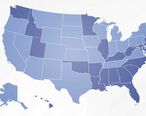Where You Live In Your 20's Affects Your Retirement
The two things may seem miles apart, but a new examination by Emily Murray at the Department of Public Health at University College, London, shows that where you spend or spent your youth could have a drastic impact on how comfortable you are later in life.

Head over to The Conversation to check out the full piece, but Emily Murray from UCL wrote a fascinating article on how where you live in your youth could have far-reaching impacts on your ability to retire—if at all.
The key evidence comes as they divided a cohort they were studying into three groups and charted the locations where they had lived in early childhood (age 4), early adulthood (age 26) and mid-life (age 56). It showed that the average age of retirement was around 59 (lower than the state pension age in the UK of 65), but that "retirement" had taken on a new meaning: those who lived in areas of high unemployment at mid-life tended to retire earlier, and for every 5% increase in unemployment, those people retired, on average, 1.5 years earlier.
This may show that it wasn't really a conscious effort to retire, but a health- or employment-related challenge that forced retirement.
Moreover, as the team dug deeper, they found that there's a link between where people lived in young adulthood and the age they eventually retired. The thesis is that the context they lived in as a young adult helped shape their future success (or struggles); if there was economic opportunity there, they thrived, if not, they just got by.
This coincides with an important theme we've talked about over and over again at Age Friendly Advisor: how incredibly important context is for aging. It's why we went to the trouble to build a database of every city and town in America and score them on how Age Friendly they are. Aging is a team sport, and the place you live should be supporting you and providing a healthy context for your late adulthood.
Head over to The Conversation to see the full write-up and let us know below: do you think the place you lived in your 20's helped define your financial outcome today?














There are no comments for this article yet. Be the first to leave a comment